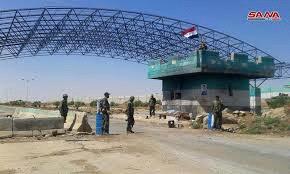Ammon News - AMMONNEWS - Jordan is welcoming the news that the Syrian army took control of the Nassib border crossing July 7, weeks after Syria and Russia launched a joint offensive to recapture the southern Syrian province of Daraa from rebel groups.
On July 8, The Jordan Times quoted a top military commander as saying the Syrian army’s success in regaining control of the crossing is a “positive development” for Jordan’s national security. Jordanian Brig. Gen. Khaled Massaid, the commander of the northern military region, told the paper that Syria is now in full control of its side of the Jaber/Nassib border crossing, after the Jordanian Armed Forces did its part while the border outpost was in the hands of “terrorist organizations.”
This was the first time Jordan has described rebel groups that took control of Nassib in 2015 as “terrorists,” although Amman closed the border crossing with Syria after that.
On July 5, the United Nations refugee agency, UNHCR, said there were 60,000 displaced Syrians at the Jordanian border. But according to Jordan, by July 8, after the truce, there were only 8,000 left at the borders. Massaid said on July 8 that "90% of the Syrians stranded on the border have returned to their homes.”
Following a Syrian-Russian offensive that began in mid-June, a growing number of Jordanians denounced their government’s decision to close its northern borders to prevent thousands of displaced Syrians from entering.
During the week of July 1, Jordanian Prime Minister Omar Razzaz announced a campaign to send humanitarian aid across the border to help displaced Syrians, and Jordanian government spokeswoman Jumana Ghuneimat said Jordan was opening three humanitarian corridors to deliver aid to refugees inside Syria.
Politically, Jordan put pressure July 1 on the government opposition groups that make up the Free Syrian Army in Daraa, urging them to negotiate with Russia to end the fighting and reach an agreement allowing for a peaceful handover of the province to government control. But on July 4, negotiations between the two parties collapsed and the Syrian regime and Russia resumed aerial bombardment of Daraa and other rebel-held towns.
Ghuneimat reiterated July 4 that there is no military solution to the crisis and urged both sides to return to the negotiating table, according to Ammonnews.net. She called on international organizations to step in to help the displaced in southern Syria. Also on July 4, Jordanian Foreign Minister Ayman Safadi met in Moscow with his Russian counterpart, Sergey Lavrov. Safadi urged the Russians to allow for a cease-fire in Daraa to avoid a major humanitarian crisis in the southern province, according to The Jordan Times.
By July 6, various news reports suggested that such an agreement was reached, signaling an end to rebel control of most of southern Syria.
Fayez al-Duwairi, a retired Jordanian army general and military analyst, told Al-Monitor he believes that while Jordan’s political efforts were instrumental in reaching an agreement to negotiate, Russian efforts are what finally prevailed. “War in Syria began in Daraa and will end in Daraa,” he said. Jordan, he added, will be relieved to see the Syrian army deployed along its borders, and so will Israel.
Hassan al-Barrari, an international relations professor at the University of Jordan, told Al-Monitor that Jordan could do little to avert what was inevitable in Daraa and that the Syrian army’s deployment in southern Syria had come as a result of an agreement between Russia, the United States and Israel. “That deal allows [for Syrian President] Bashar al-Assad to stay in power [at least temporarily] in return for limiting Iranian presence in Syria, which Russia will guarantee,” Barrari said. “The deployment serves Jordan’s interests as well and moves the fighting to Idlib in the north,” he added.
The reopening of the border crossing between Jordan and Syria is a political decision and indicates an improvement in relations between the two countries after seven years of tensions — since the Syrian civil war began in 2011. On July 8, Syria’s official news agency (Sana) said the highway connecting Syria with Jordan would be ready to reopen within a week.
Damascus had accused Amman in the past of training and arming the rebels. But Jordan’s role in pressuring the rebels to accept a deal with the government will go a long way toward clearing the air. Jordan has maintained diplomatic ties with Damascus, insisting throughout the Syrian crisis that only a political solution would end it.
And now that the Syrian government is back in control in the south, Amman hopes Russia will help pave the way for the repatriation of the more than 600,000 Syrian refugees who are in the kingdom. (Some estimates say that 650,000 is only the number of Syrian refugees in Jordan who have registered with UNHCR, but that as many as 1.3 million reside there.)
Furthermore, reopening the border crossing should revive Jordan’s economy and encourage Jordanian companies to participate in reconstruction efforts in southern Syria in the future.
*Al-Monitor








 comment replay
comment replay 